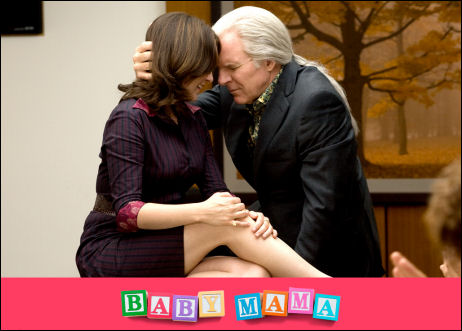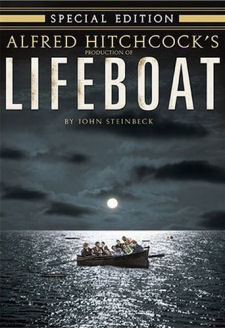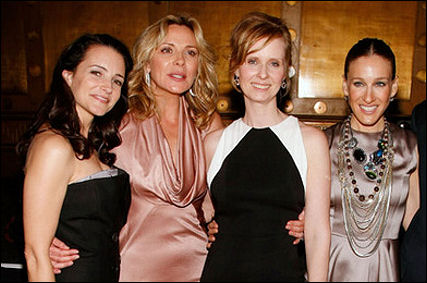Taking time out from his promotion tour for his latest book, “The Woman Who Wouldn’t,” (St. Martin’s), author Gene Wilder offers consolation to Barack Obama about the voters of western Pennsylvania.
Martin Steals Baby Mama?
“There are gags and scraps of action in Baby Mama (Universal, 4.25) that give the movie fits of buoyancy, and these tend to come not so much from the younger, eager performers as from the old hands. If you want to see scene-stealing turned into grand larceny, watch Sigourney Weaver, as the owner of the surrogacy service, or, better still, Steve Martin, as the presiding genius of Round Earth.

Tina Fey, Steve Martin
“Hand the guy a thick hank of ponytail, relieve him of the burden of a central role, aim him squarely at the bull√ɬ¢√¢‚Äö¬¨√¢‚Äû¬¢s-eye of eco-smugness (‘I√ɬ¢√¢‚Äö¬¨√¢‚Äû¬¢ve toasted pine nuts on the edge of an active volcano’), and you find him happier onscreen than I have seen him in years. Who cares whose baby is inside which mother, when the laughs come from the grown man doing business with his inner child?” — from Anthony Lane‘s 4.28 New Yorker review.
Revulsion Levels
“Over the past two months, the actions and words of Hillary Clinton have gone from being merely disappointing to downright disgusting. I guess the [Pennsylvania] debate last week was the final straw. I’ve watched Senator Clinton and her husband play this game of appealing to the worst side of white people, but last Wednesday, when she hurled the name ‘Farrakhan’ out of nowhere, well that’s when the silly season came to an early end for me. She said the ‘F’ word to scare white people, pure and simple.
“Yes, Senator Clinton, that’s how you sounded. Like you were a bigot stoking the fires of stupidity. How sad that I would ever have to write those words about you. You have devoted your life to good causes and good deeds. And now to throw it all away for an office you can’t win unless you smear the black man so much that the superdelegates cry ‘Uncle (Tom)’ and give it all to you.
“I want [also] to say a word about the basic decency I have seen in Senator Obama. Mrs. Clinton continues to throw the Rev. Wright up in his face as part of her mission to keep stoking the fears of White America. Every time she does this I shout at the TV, ‘Say it, Obama! Say that when she and her husband were having marital difficulties regarding Monica Lewinsky, who did she and Bill bring to the White House for ‘spiritual counseling?’ The Reverend Jeremiah Wright!”
“But no, Obama won’t throw that at her. It wouldn’t be right. It wouldn’t be decent. She’s been through enough hurt. And so he remains silent and takes the mud she throws in his face. That’s why the crowds who come to see him are so large. That’s why he’ll take us down a more decent path. That’s why I would vote for him if Michigan were allowed to have an election.” — Michael Moore on his website today (4.21).
Dullness Dullness
Michel Shane and Anthony Romano (I Robot, Catch Me if You Can) managed to get Variety‘s Dave McNary to write about how they’re developing Lifeboat 13, which is based on the WWII story of the four chaplains of different faiths who gave their lives during the 1943 sinking of the Dorchester after it was torpedoed by a German sub.

Read these two summaries of the four chaplains saga — — Wikipedia’s and this other hokey one — and tell me where the movie is. Wartime self-sacrifice deservedly wins medals, but a willingness to die so that other might live does not make for an interesting story in and of itself. Touching, yes, but certainly sad, but in a generic wartime sense. Their sacrifice lacks intimacy and therefore meaning, I would argue. Leonardo DiCaprio‘s Jack Dawson realizing Kate Winslet‘s Rose has to float on the wooden chest alone or they’ll both die of hypothermia has that element. Four men of the cloth helping and saving others from death is the stuff of war monuments, not movies.
On top of which the basic bones of the four chaplains story are nowhere near as interesting as the story used for Abandon Ship! (or Seven Waves Away), a 1957 black-and-white Tyrone Power film about a shipwrecked captain forced to order survivors out of an overcrowded lifeboat in order to save most of the others. Now that‘s a story! And there’s no way this sappy four chaplains movie will be half as interesting as Alfred Hitchcock‘s Lifeboat. Walter Slezak‘s character alone makes that film play nearly as well today as ti did in ’43.
So no intended offense but my advice to Shane and Romano is to pull the plug on their project. Forget it. The only people who might want to see a movie about the four chaplains being God’s good samaritans and then willingly freezing and drowning to death so that some of their fellow soldiers might live (even though dozens died anyway from hypothermia when they went into the water) will be the over-60 crowd and John McCain voters…maybe.


London Calling
The Envelope‘s Elizabeth Snead ran a “Dish Rag” story Friday about Warner Bros./New Line’s Sex and the City apparently planning its first big premiere in London sometimes between May 13th and 16th, with the New York premiere set for May 27th.

Okay, but shouldn’t Snead have at least explained why the Cannes Film Festival debut notion, which Sarah Jessica Parker said was a possibility in a Snead article that ran on 3.14, has apparently been deep-sixed? If this is the case, I’m not convinced, as Defamer‘s Stu Van Airsdale wrote last Friday, that this means SATC has been jilted or pink-slipped by Cannes.
My guess is that the Warner Bros. handlers simply decided against the Cannes option because they didn’t want to endure a DaVinci Code-like pummeling by festival correspondents and figured London would offer more of a slurpy kiss-ass reception. There’s also the possibility that the film is quite good or at least satisfying on its own terms and that the Cannes sidestep means nothing at all in terms of “uh-oh” indications. I’m only saying that Snead should have addressed this.
Wait It Out
Indiana Jones and the Kingdom of the Crystal Skull principals George Lucas, Steven Spielberg and Harrison Ford shined their upfront fees and won’t see any Indy money until the film grosses $400 million worldwide, according to a 4.21 column by L.A. Times business reporter Claudia Eller.
“If that seems like a no-brainer, consider the norm in Hollywood, where top-tier filmmakers and stars traditionally earn huge upfront fees and get a big cut of ticket sales before a studio recoups its investment,” Eller writes.
“The atypical arrangement between the studio and the triumvirate illustrates the new economic realities of the movie business. As production and marketing costs continue to escalate amid flat theater attendance and declining DVD sales, studios are increasingly looking for ways to protect themselves from colossal losses on a single picture.”
While I Was Driving…
Do anything at all in the way of personal weekend enjoyment and you lose — that’s the reality of doing a 24/7 column (or at least one that aspires to same). My drive up to San Francisco from 1:30 pm last Friday afternoon to 8 pm early Friday evening had something to do with missing the story about James Caan recently walking off the set of David O. Russell‘s Nailed.

I have a comment however: if you can’t deal with rancor and eccentricity and the occasional yelling episode, you really shouldn’t be an actor. Fighting and disharmony are a part of the quilt — you can’t quarantine them and still be an artist. If everything has to be mellow and alpha every step of the way, you’re basically processing things like a child or a prima donna. Adults stand up and grapple. They give and take and sort things through, and then move on. Ranting doesn’t help anyone’s creativity and is therefore unfortunate when it happens, but Otto Preminger was said to be a dislikable prick on the set (at least occasionally) and his rep keeps going up every year.
Chuck Todd Knows
I love this description of undecided Pennsylvania voters (possibly as high as 8% right now) by MSNBC’s Chuck Todd as “bowlers, hunters, beer-drinkers….the cultural conservatives.” You can literally see his brain deciding not to say (take your pick) the 21st Century Archie Bunkers, the timids, the go-alongers, the dolts, the lacking-in-conviction crowd, the blue-collar dipsticks.
He’s right, I suspect, about the likelihood of the Nanooks breaking for Clinton at the last minute — that or not voting for her at all. If it’s the latter her expected Pennsylvania win will be kept to five or six or seven percentage points, and will be therefore dismissable.
Jones-ah! Mr. Jones-ah!
A guy who knows a guy who’s on the Indiana Jones and the Kingdom of the Crystal Skull team has passed along #2’s impressions of the finished film. I’m not 100% comfortable running them, given the obvious fact that #2 is a coward, cowering like an eight year-old girl behind the creased khaki slacks of #1, as well as a shill and a spinner, but here goes anyway:
“I felt compelled to write, having just read Anne Thompson‘s 4.17 Variety column which states that ‘the advance buzz on Indy 4 is getting damaging enough that Lucas and Spielberg may want to reconsider the current strategy of waiting until May 18 to show the film…that’s a long way off.’
Composer John Williams, Guy #2 says, was initially correct on the Indy 4 running time of 140 minutes, but the film “underwent belt tightening and has been receiving customary tweaking for its final mix.”
Indiana Jones and the Kingdom of the Crystal Skull “is the best of the Indy sequels,” he declares. “Steven Spielberg‘s helming puts the imitators (The Mummy, National Treasure) to shame. There are many breakneck set pieces, with a protracted jungle chase being particularly memorable. As well as being evocative of the truck chase from the first movie.
Harrison Ford, he claims, “gives his best performance in the role, not only physically belying his age but layering in welcome poignancy. More than before, audiences will be rooting for Indy. Shia LaBeouf makes essential contributions. Chemistry between he and Ford is palpable, yielding some nice character comedy.
“Jones is particularly beleaguered throughout the adventure, making his predicaments all the more entertaining.
“The film has the strongest supporting cast of the sequels. They all raise the bar. Ray Winstone amuses and fascinates, but the strongest impression is left by Cate Blanchett‘s Agent Spalko, a characterization that achieves instant cult status.
“Hopefully, the surprises in this film can continue to be guarded. Eventually, these spoilers will get out, but it would be shameful for reviewers and bloggers to reveal an ending that any longtime diehard fan of the films could only dream about. Expect a particularly resounding reaction in the theater.
“Kudos to screenwriter David Koepp for pulling all this together on the page. This will easily be the biggest hit of the year.”



